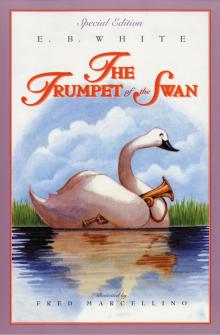- Home
- E. B. White
The Trumpet of the Swan Page 10
The Trumpet of the Swan Read online
Page 10
At the first note from his trumpet, she woke. She raised her head and her neck straightened until her head was held high. What she saw filled her with astonishment. She gazed straight at Louis. At first, she could hardly remember where she was. Directly in front of her, she saw a handsome young male swan, a cob of noble proportions. Held against his mouth was a strange instrument--something she had never seen before. And from this strange instrument came sounds that made her tremble with joy and with love. As the song went on, as the light grew stronger, she fell hopelessly in love with this bold trumpeter who had awakened her from her dreams. The dreams of night were gone. New dreams of day were upon her. She knew that she was full of sensations she had never had before--feelings of delight and ecstasy and wonder.
She had never seen a finer-looking young cob. She had certainly never seen any swan with so many personal possessions around his neck. And she had never been so thrilled by a sound before in her whole life.
"Oh!" she thought. "Oh, oh, oh, oh!"
The song ended. Louis lowered his trumpet and bowed solemnly to Serena. Then he raised his horn again.
"Ko-hoh!" he said.
"Ko-hoh!" replied Serena.
"Ko-hoh, ko-hoh!" said Louis through his trumpet.
"Ko-hoh, ko-hoh!" replied Serena.
Each felt drawn to the other by a mysterious bond of affection.
Louis swam once rapidly around Serena.
Then Serena swam once rapidly around Louis. This seemed to amuse them.
Louis dipped his neck and pumped it back and forth.
Serena dipped her neck and pumped it back and forth.
Louis splashed a little water into the air. Serena splashed a little water into the air. It was like a game. It was love at long last for Louis; it was love at first sight for Serena.
Then Louis decided to show off. "I'll play her my own composition," he thought. "The one I made up for her last summer at camp." Again he raised his trumpet.
Oh, ever in the greening spring
By bank and bough retiring,
For love shall I be sorrowing
And swans of my desiring.
The notes were clear and pure. They filled the Zoo with beauty. If Serena had been in any doubt before, she no longer was. She succumbed completely to this charmer, this handsome musician, this rich and talented cob.
Louis knew that his plan had succeeded. His beautiful dreamer had waked, and she had waked unto him. Never again would they be parted. All the rest of their lives they would be together. Thoughts of small quiet lakes in the woods, where canebrakes grew and blackbirds sang, filled Louis's mind. Thoughts of springtime and nesting and little cygnets. Oh, ever in the greening spring!
Louis had been told once by his father what happened to deep-sea divers when they go far, far down into the ocean. At great depths, where the pressure is great and the watery world is strange and mysterious, divers sometimes experience what they call the "rapture of the deep." They feel so completely peaceful and enchanted, they never want to return to the surface. Louis's father had warned him about this. "Always remember, when you dive deep," he had said, "that this feeling of rapture can lead you to your death. No matter how wonderful you feel down there, don't ever forget to return to the surface, where you can breathe again!"
Looking at Serena, Louis thought to himself, "I think love is like the rapture of the deep. I feel so good I just want to stay right where I am. I'm experiencing rapture of the deep even though I'm right on top of the water. I have never felt so good, so peaceful, so excited, so happy, so ambitious, so desirous. If love is like this on a cold day in December in the Philadelphia Zoo, imagine what it's going to be like in spring on a remote lake in Canada!"
These were Louis's secret thoughts. He was the happiest bird alive. He was a real Trumpeter Swan at last. His defect of being without a voice had at last been overcome. He felt very grateful to his father.
Cautiously, he placed his head across Serena's long beautiful white neck. It seemed a very daring thing to do, but she seemed to like it. Then he backed away. Serena swam toward him. Cautiously, she placed her head across his neck. It rested there for a moment; then she swam away.
"What a daring thing!" she thought. "But he seems to like it. How pleasing to know that I have found an acceptable mate--a cob I can love and respect, a cob that appears to be not only musical but also quite wealthy. Look at all those things!" said Serena to herself. Her eyes feasted on the trumpet, the slate, the chalk pencil, the moneybag, the lifesaving medal.
"What a gay cob!" she thought. "What a dressy fellow!"
They swam off together toward the other end of the lake, where they could be alone. Then Louis, who was short on sleep, dozed off, while Serena ate her breakfast and fixed herself up.
CHAPTER 18
FREEDOM
The news of Serena's arrival on Bird Lake had finally reached the Head Man in Charge of Birds. He went out to look at her and was delighted. Then he gave an order to one of his keepers.
"See to it that she is pinioned this morning--right away, before she flies off and leaves us. That swan is a valuable bird. Make sure she doesn't get away!"
Louis was just waking from his nap when he saw two keepers approaching Serena, who was standing on the shore near the ornamental fence. One keeper carried a large net with a long handle. The other carried surgical instruments. They were sneaking up on Serena from behind, very slowly and quietly.
Louis knew right away what they were up to. He grew hot with rage. If those men succeeded in catching Serena and cutting a wing tip, all his plans would go wrong--she could never fly away to a lonely lake with him; she would have to remain in Philadelphia the rest of her life, a horrible fate.
"This is my moment," thought Louis. "Nobody is going to clip my Love's wing while I'm around."
He hustled over to the island and stripped for action. He chucked his trumpet and all his other stuff under a willow tree. Then he returned to the water and waited for the right time to attack.
The keeper holding the net was crawling quietly up on Serena from the rear. She did not notice him--she was just standing there, dreaming of Louis. Slowly, slowly the keeper raised his net. As he did so, Louis went into action. Lowering his long, powerful neck until it pointed straight out in front of him like a lance, he streaked across the water, straight at the keeper, his wings beating the air, his feet beating the water. In a flash, he reached the scene and drove his strong bill straight into the seat of the man's pants. It was a well-aimed jab. The keeper doubled up in pain and dropped the net. The other keeper tried to grab Serena by her throat. Louis beat him over the head with his wings, striking terrific blows and knocking the poor fellow off his feet. Surgical instruments bounced into the air. The net fell into the water. One keeper groaned and held his hand on his behind, where he had been stabbed. The other keeper lay on the ground, almost knocked out.
Serena slipped quickly into the water and glided gracefully away. Louis followed. He motioned for her to stay on the lake. Then he raced back to the island, grabbed his trumpet, his slate, his chalk pencil, his medal, and his moneybag, flew over the balustrade, and walked boldly into the Bird House. He was still mad. He went straight to the office of the Head Man in Charge of Birds. He rapped on the door.
"Come in!" said a voice.
Louis entered. The Head Man was seated at his desk.
"Hello, Louis!" he said.
"Ko-hoh!" replied Louis through his trumpet.
"What's on your mind?" asked the man.
Louis placed his trumpet on the floor and took his slate and chalk pencil from his neck. "I'm in love," he wrote.
The Head Man leaned back in his chair and put his hands behind his head. His face had a faraway look. He gazed out of the window for a moment in silence.
"Well," he said, "it's natural that you're in love. You're young. You're talented. In a couple of months, spring will be here. All birds fall in love in springtime. I suppose you're in love with one of my you
ng swans."
"Serena," wrote Louis. "She arrived the day before yesterday. I used to know her slightly, back in Montana. She loves me, too."
"That doesn't surprise me," said the Head Man. "You're a very unusual young cob. Any young female swan would fall for you. You're a great trumpeter--one of the best. I'm delighted to hear about this love affair, Louis. You and your bride can stay right here on Bird Lake and raise your family in comfort and safety, in the oldest zoo in the United States."
Louis shook his head.
"I have other plans," he wrote. Then he set his slate down and raised his trumpet. "They say that falling in love is wonderful . . ." It was an old song by Irving Berlin. The room was filled with the sound of love. The Head Man had a dreamy look in his eyes.
Louis set his horn down and took up his slate again. "I am taking Serena away with me in a day or two," he wrote.
"Oh, no you're not!" said the Head Man firmly. "Serena now belongs to the Zoo. She is the property of the people of Philadelphia. She came here because of an act of God."
"It wasn't an act of God," wrote Louis. "It was a high wind."
"Well, anyway," said the Head Man, "she's my swan."
"No, she's mine," wrote Louis. "She's mine by reason of the power of love--the greatest force on earth."
The Head Man became thoughtful. "You can't take Serena from the Zoo. She will never fly again. My keepers clipped one of her wings a few minutes ago."
"They tried to," wrote Louis, "but I beat them up."
The Head Man looked surprised. "Was it a good fight?"
"It was a fair fight," replied Louis. "They were sneaking up on her from behind, so I sneaked up on them from behind. They hardly knew what hit them."
The Head Man chuckled. "I wish I'd seen it," he said. "But look here, Louis, you've got to realize the position I'm in. I have a duty to the people of Philadelphia. Within the last couple of months, I've acquired two rare birds by accident--you and Serena. Two Trumpeter Swans! One arrived here blown by a gale, the other to keep a nightclub engagement. The whole business is most unusual for a zoo. I have my responsibility to the public. It is my duty as Head Man in Charge of Birds to see that Serena stays. You yourself, of course, are free to leave when you want to, because Mr. Lucas insisted that you remain free when we arranged for your Sunday concerts. But in Serena's case . . . well, Louis, she's got to have her left wing tip amputated. The Zoo can't afford to lose a young, beautiful, valuable Trumpeter Swan just because you happen to be in love. Besides, I think you're making a great mistake. If you and Serena stay here, you'll be safe. You'll have no enemies. You'll have no worries about your children. No fox, no otter, no coyote will ever attack you with intent to kill. You'll never go hungry. You'll never get shot. You'll never die of lead poisoning from eating the shotgun pellets that are on the bottom of all natural lakes and ponds. Your cygnets will be hatched each spring and will live a long life in perfect ease and comfort. What more can a young cob ask?"
"Freedom," replied Louis on his slate. "Safety is all well and good: I prefer freedom." With that, he picked up his trumpet and played "Button up your overcoat, when the wind blows free . . ."
The Head Man smiled. He knew just what Louis meant. For a while the two remained silent. Louis put his trumpet aside. Then he wrote: "I ask two favors. First, put off the operation on Serena until after Christmas--I'll guarantee she won't try to escape. Second, let me send a telegram."
"O.K., Louis," replied the Head Man. And he handed Louis a sheet of paper and a pencil. Louis wrote out a telegram to Sam Beaver. It said:
AM IN THE PHILADELPHIA ZOO. THIS IS AN EMERGENCY. COME AT ONCE. I WILL PAY YOUR PLANE FARE. AM NOW WEALTHY.
(Signed) LOUIS
He handed the telegram to the Head Man along with four dollars from his money bag. The Head Man was astounded. In all his days at the Zoo, this was the first time one of his birds had asked him to send a telegram. And of course he didn't know who Sam Beaver was. But he sent the wire and ordered his keepers to let Serena alone for a few days--which they were glad to do.
Louis thanked him and left. He returned to Serena, and they spent the day happily together, bathing, swimming, eating, drinking, and showing each other in a thousand small ways how much they loved each other.
Sam arrived at the Zoo on the day after Christmas. He was equipped as though he were going into the woods. Under one arm was a sleeping bag, neatly rolled. On his back was a rucksack containing his toothbrush, his comb, a clean shirt, a hand ax, a pocket compass, his notebook, a pencil, and some food. In his belt was a hunting knife. Sam was fourteen now and big for his age. He had never seen a large zoo. He and Louis were overjoyed to see each other again.
Louis introduced Sam to Serena. Then he opened his moneybag and showed Sam his earnings: hundred-dollar bills, fifty-dollar bills, twenty-dollar bills, tens, fives, ones, and some silver coins--a great pile.
"Goodness!" thought Sam. "I hope she's not marrying him for his money."
Louis took his slate and told Sam about the fight with the keepers and about how the Head Man wanted to keep Serena captive by clipping the tip of one wing. He told Sam it would ruin his life if Serena were to lose the power to fly. He explained that as soon as his father's debts were paid and the trumpet honestly belonged to him, he and Serena intended to leave civilization and return to a wild life. "The sky," he wrote on his slate, "is my living room. The woods are my parlor. The lonely lake is my bath. I can't remain behind a fence all my life. Neither can Serena--she's not built that way. Somehow or other we must persuade the Head Man to let Serena go."
Sam stretched out on the shore of Bird Lake and clasped his hands behind his head. He looked up at the great wide sky. It was a clear blue, with small white clouds floating slowly across. Sam knew how Louis felt about freedom. For a long time he lay there, thinking. Ducks and geese swam slowly by, back and forth, an endless procession of captive birds. They seemed happy and well. Curiosity, Felicity, and Apathy--the three Trumpeters--swam by and peered at the strange boy lying on the ground. Finally Sam sat up.
"Listen, Louis," he said. "How's this for an idea? You and Serena intend to raise a family every year, don't you?"
"Certainly," replied Louis on his slate.
"O.K.," said Sam. "In every family of cygnets, there is always one that needs special care and protection. Bird Lake would be a perfect place for this one little swan that needs extra security. This is a beautiful lake, Louis. This is a great zoo. If I can persuade the Head Man to let Serena remain free, would you be willing to donate one of your cygnets, now and then, if the Zoo needs another swan for the lake? If you agree, I'll go right in and see the Head Man about the matter."
It was now Louis's turn to think and think. After five minutes, he picked up his slate.
"Very well," he wrote. "It's a deal."
Then he picked up his trumpet. "Oh, ever in the greening spring," he played. "By bank and bough retiring . . ."
The waterfowl stopped swimming and listened. The keepers stopped what they were doing and listened. Sam listened. The Head Man in his office in the Bird House laid down his pencil, leaned back in his chair, and listened. The sound of Louis's horn was in the air, and the whole world seemed better and brighter and wilder and freer and happier and dreamier.
"That's a good tune," said Sam. "What is it?"
"Oh, just something I made up myself," wrote Louis on his slate.
CHAPTER 19
A TALK ABOUT MONEY
In almost everyone's life there is one event that changes the whole course of his existence. The day Sam Beaver visited the Philadelphia Zoo was the turning point in his life. Up until that day, he had not been able to decide what he wanted to be when he grew up. The minute he saw the Zoo, all his doubts vanished. He knew he wanted to work in a zoo. Sam loved every living thing, and a zoo is a great storehouse of living things--it has just about every creature that creeps or crawls or jumps or runs or flies or hides.
Sam was eager to see them all
. But he had Louis's problem to solve first. He must save Serena from captivity. So he picked up his rucksack and his sleeping bag and walked into the Bird House and entered the office. He walked tall and straight, as though he were on a forest trail. The Head Man liked Sam's appearance and noticed that he looked a little like an Indian.
"So you're Sam Beaver," said the Head Man, as Sam advanced on him.
"Why did you come here?" asked the Head Man.
"To defend freedom," replied Sam. "I heard you intended to clip the wing of a swan. I'm here to ask you not to do it."
Sam sat down, and they talked for a whole hour. Sam assured the Head Man that Louis was an old friend. He told about discovering the swan's nest almost three years ago in Canada, about how Louis came into the world lacking a voice, about Louis's attending school in Montana and learning to read and write, about the theft of the trumpet by Louis's father, the old cob, and about Camp Kookooskoos and the Swan Boat in Boston.
The Head Man listened with great attention, but he wasn't sure he believed a word of this strange tale.
Then Sam explained his proposal for allowing Serena to go free instead of making a captive bird out of her. He said he thought it would be a good arrangement for the Zoo, because any time they wanted a young Trumpeter Swan, Louis would give them one of his cygnets. The Head Man was fascinated.
"You mean to say you came all the way to Philadelphia to help a bird?"
"Yes, sir," replied Sam. "I would go anywhere to help a bird. Besides, Louis is special. He's an old friend. We went to the same school. You've got to admit he's quite a bird."
"He sure is," said the Head Man. "His Sunday afternoon concerts have been the biggest attraction the Zoo has ever had. We had a gorilla once named Bamboo--he's dead now. Bamboo was great, but Louis draws even more of a crowd than Bamboo did. We have sea lions that draw big crowds, but nothing to compare with Louis when he plays that horn on Sunday afternoons. People go crazy. And music is good for the animals, too--it soothes them, and they forget the cares of the day. I'm going to miss Louis when he's gone. The whole Zoo will miss him terribly. I wish he'd stay and keep his bride right here--it would be just great."

 Charlotte's Web
Charlotte's Web Stuart Little
Stuart Little The Elements of Style
The Elements of Style Here Is New York
Here Is New York The Trumpet of the Swan
The Trumpet of the Swan Essays of E. B. White
Essays of E. B. White Writings from the New Yorker 1925-1976
Writings from the New Yorker 1925-1976 Letters of E. B. White
Letters of E. B. White